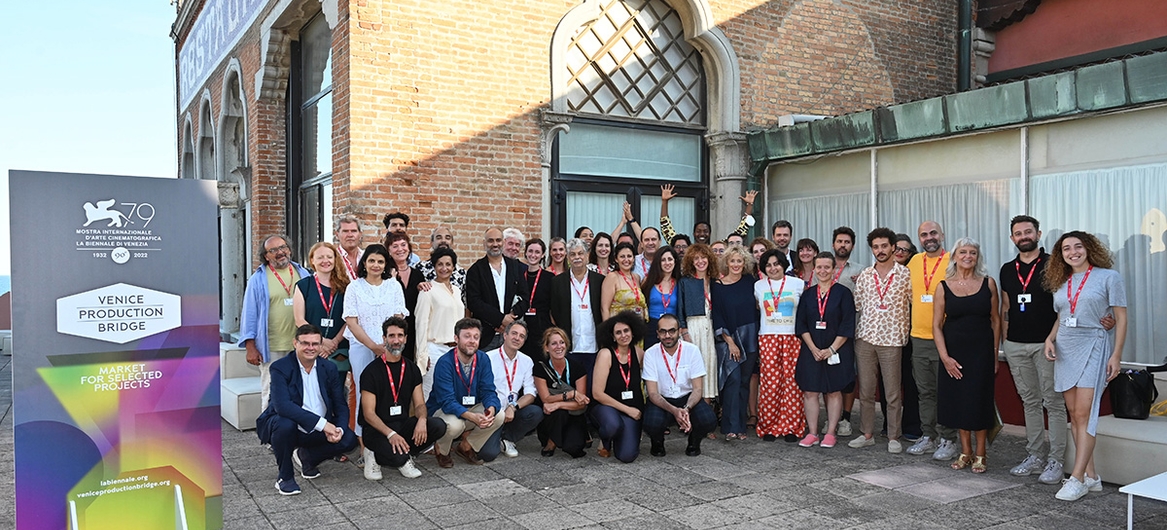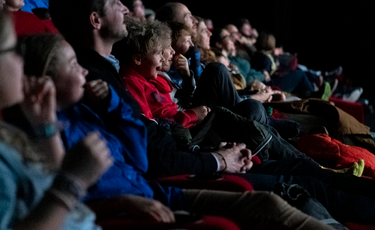
In September, Fabienne Menétrey, member of the Selection Committee and Head of Cultural Projects at FIFF, was the Fribourg International Film Festival's representative, for the second successive year, at the Final Cut in Venice, part of the Mostra di Venezia. In this interview, she explains what the mission of Final Cut is and shares some of her experiences and insights from the 2022 edition.
What is Final Cut in Venice?
FM: It’s an initiative that supports filmmakers complete their films. To receive support, applicants must meet two conditions: they must be from Africa, Jordan, Lebanon, Palestine or Syrian, and their feature or documentary film must be at the post-production phase.
What kind of support does Final Cut in Venice offer?
FM: The 15 organisations which partner Final Cut offer a wide range of support. The aim is to give filmmakers the practical help they need to complete their film, whether it is actual funding or services in kind like covering the costs of subtitling or marketing support. FIFF covers the costs of producing a DCP, the digital file that cinemas use to screen a film (Ed.: an encrypted and very large data file). Support is also indirect: the mere fact that one of the most important film festivals in the world gives them the opportunity to show their work is an amazing springboard for their careers. The festival is also a golden networking opportunity for these filmmakers.
Why is it important that FIFF is part of this initiative?
FM: Initiatives like Final Cut in Venice make it possible to tangibly support the creation, production and distribution of films from countries outside the continent of Europe and North America. This dovetails with one of FIFF’s founding missions.
How does Final Cut in Venice actually work?
FM: First, there are the film screenings. There were eight this year. The filmmakers and producers present a 60-cut of their film, then each screening is followed by a Q & A session. This year, the screenings were spread over two days. Afterwards, there are discussions with the teams and the final deliberation. On the third evening, Final Cut in Venice closes out with the award ceremony.
Which film did you select on behalf of FIFF?
FM: I chose Inshallah Wallad (Inshallah a boy) which is the first feature from Jordanian filmmaker Amjad Al Rasheed.
It tells the story of Nawal – played beautifully by Mouna Hawa – who suddenly loses her husband and finds herself at risk of losing her home and everything she owns because inheritance law stipulates that, because she does not have a son, her in-laws can claim most of the inheritance.
The producer Rula Nasser also co-produced Amira, which won the Comundo Youth Jury Award at FIFF this year.
Will the FIFF audience get a chance to see it at the Festival?
FM: Some of the projects presented at Final Cut in Venice meet FIFF selection criteria in terms of the country of origin, subject matter and quality. However, these films have a long journey ahead of them before they get to that point. First of all, the filmmakers need to finish production, then they have to find international distributors. Even if they eventually make it on to the FIFF shortlist, they still need to win over the Selection Committee.
But it does happen! FIFF audiences have already had the chance to watch three films from Final Cut in Venice
- Le Challat de Tunis (Kaouther Ben Hania, Tunisia, France, 2013): screened at FIFF 2016
- Zaineb n’aime pas la neige, Kaouther Ben Hania (Tunisia, France, 2016): screened at FIFF 2018
- Ghost Hunting, Raed Andoni (Palestine, France, Switzerland, Qatar, Italy, 2017): screened at FIFF 2021




